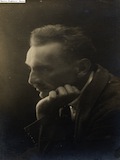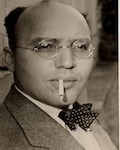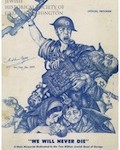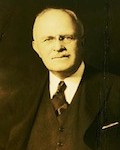While visiting the United States in 1943, Leib Jaffe (1876-1948), an editor and poet from Palestine, sought to galvanize American Jewish leaders to respond more energetically to the slaughter of European Jewry.
Jaffe, a Hebrew poet, former editor of the newspaper Ha’aretz, and fundraiser for the Zionist movement, arrived in New York in December 1942 on a fundraising mission, just as the news of the Nazi genocide was being confirmed by the Allies.
In a letter that he sent in early 1943 to Rabbi Stephen S. Wise, leader of the American Jewish Congress, Jaffe wrote: “The last cry of agony of our people comes to us. The flower of our people–the bearers of Jewish culture–is destroyed…We cannot be silent. Jewish history will never forgive it. The blood of our brethren cries out to us.” Jaffe pleaded with Wise to mobilize “hundreds of thousands of Jews into the streets to express their grief and indignation.”
In July 1943, Jaffe secured permission to address a meeting of the Joint Emergency Committee on European Jewish Affairs, the umbrella group set up by mainstream Jewish organizations to discuss how to respond to the Nazi genocide. “[I] cannot understand how American Jewry can keep quiet upon their hearing the last dying groans of European Jewry,” Jaffe said at the meeting. “We have to do something that goes beyond the norm, an event as great as the tragedy that has befallen us, an event that will waken the spirit of the quiet Jews and will shock the cold and cruel world….God shall never forgive us if we do not raise our voices at this time.” Jaffe urged the Jewish leaders to organize “mass demonstrations” by Jews and Christians, and to “get hundreds of rabbis out of their houses so that they march in the demonstration with Torah scrolls in their hands. From every synagogue in the nation of Israel, there should be a voice crying out in protest.”
Jaffe’s plea did not have the desired effect. Rabbi Wise’s close ally, World Jewish Congress co-chairman Nahum Goldmann, derided Jaffe’s call for demonstrations, asserting (according to Jaffe’s account) that “in Washington they would not like such a demonstration, that they are already tired of us, and that some Senators have expressed their displeasure.”
Jaffe was disappointed by the Joint Emergency Committee’s response, but impressed by the Bergson Group’s Emergency Conference to Save the Jewish People of Europe. He wrote to colleagues in Palestine that the event featured “some of the greatest writers in the United States, leaders of American public opinion, and American political leaders of both parties,” and had attracted widespread publicity for the idea that rescue was still possible. Although Jaffe was himself a lifelong Labor Zionist while some of the Bergson Group’s leaders had been associated with Revisionist Zionist leader Vladimir Ze’ev Jabotinsky, he praised the group’s conference as “a revolt of young energetic men against the inactivity of the old men who cannot get out of their routine.”
Sources: Medoff, Our Leaders Cannot Be Moved pp.115-126.











